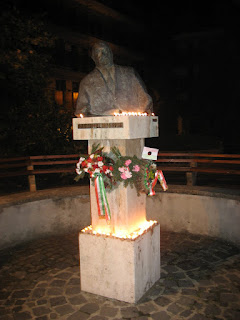Today is the 23rd of October. That probably doesn't mean a lot to you - unless you're a Hungarian. In that case, it means a great deal.
 |
| Hungary and Békéscsaba. |
On October 23, 1956, the Hungarians decided they'd had enough of the Soviet occupation of their country. The people, mostly led by students, became more outspoken. They started demonstrating and spreading their cause, all the while being watched by a ruthless government. Protests grew larger, and the people claimed a new Prime Minister who withdrew Hungary from the Warsaw Pact (and thus, the control of the Soviet Union). Eventually, rallies and idealistic flagwaving turned to violence.
A statue of Stalin was torn down. Arms were taken up. Secret policemen were shot on sight. The city of Budapest fell to the people, and the Russians were thrown out. The Hungarians had won, and they now controlled their country.
Victory, however, was short-lived. A few weeks later, Soviet tanks entered the city and crushed the resistance. They regained control, set up their own government, and executed Nagy Imre (the temporary Prime Minister).
 |
| Stores were closed but flags were out. |
The revolution failed.
Most stores were closed today to honor the memory. I saw a sort of commemoration ceremony, complete with a play, in the square named for Nagy. There were Hungarian flags all over Békéscsaba, and, I'm sure, the rest of the country. Some had a hole cut out of the center to look like the flags of 1956. At that time, the flag had a Soviet symbol in the center, so the revolutionaries cut it out.
As an American, it seems odd a country would be proud of a failed revolution. We always try to ignore the unsuccessful parts of our history. This topic is one that I've discussed with both Hungarians, and Americans who live here. This has opened my eyes to a few different facts that I hadn't thought of.
 |
| There was an explosion sound, and everyone ducked. |
Second, they didn't win, but they didn't quite lose. After the revolution, the Hungarian system was referred to as Goulash Communism. Things were better than they were before, and stayed that way until the U.S.S.R. collapsed. They didn't get rid of the Soviets, but they had it better than most other countries controlled by them.
Third, they endured. The Hungarians have great pride that their country and people are over a thousand years old. They have been invaded, occupied, and beat up time and time again. Yet, they have survived and outlasted all of these powerhouse empires.
 |
| Nagy Imre at night. |
No comments:
Post a Comment